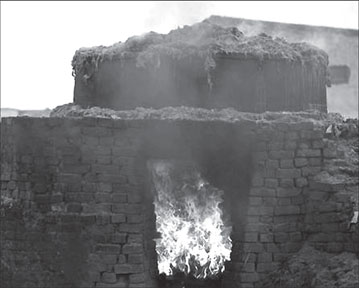Soot causes twice as much global warming as previously thought
Cutting ‘black carbon’
emissions could help to cool the planet, according to scientists
Soot created by the incomplete burning of fossil fuels and organic
matter is the second most important man-made substance behind global
warming and reducing its emission into the atmosphere could buy valuable
time in tackling climate change, a major study has found.
 New estimates of how much soot, or “black carbon” as it is known by
scientists, is released into the atmosphere show that it causes about
twice as much warming as previously believed. New estimates of how much soot, or “black carbon” as it is known by
scientists, is released into the atmosphere show that it causes about
twice as much warming as previously believed.
Emissions
Cutting emissions could help to cool the planet, scientists said.
Black carbon, which is released from diesel engines, coal-fired power
stations and wood-burning stoves, has a warming effect of 1.1 Watts per
square metre, which is about two thirds the warming effect of carbon
dioxide, the principle man-made greenhouse gas.
The new study found that soot emissions globally are substantially
larger than previously estimated. It found that black carbon is a
significant cause of the rapid warming seen in northerly regions of
America, Canada and northern Europe and Asia and its effects extend
further south, inducing changes in rainfall patterns of the Asian
monsoon. Reducing soot emissions with filters or more efficient forms of
combustion could lower global temperatures over the coming couple of
decades and would create a breathing space for the more difficult
long-term task of reducing carbon dioxide emissions, scientists said.
“There are exciting opportunities to cool climate by cutting soot
emissions, but it is not straightforward. Reducing emissions from diesel
engines and domestic wood and coal fires is a no-brainer, as there are
tandem health and climate benefits,” said Prof Piers Forster of Leeds
University, a co-author of the new report.
“If we did everything we could to reduce these emissions, we could
buy ourselves up to half a degree [Celsius] less warming, or a couple of
decades of respite,” Professor Forster said.
However, the incomplete combustion of fossil fuels and organic matter
produces other substances, such as sulphate aerosols, that have an
opposite effect by cutting out incoming sunlight and cooling the
climate, the scientists warned.
“Mitigation is a complex issue because soot is typically emitted with
other particles and gases that probably cool the climate.
Cooling effect
For instance, organic matter in the atmosphere produced by open
vegetation burning likely has a cooling effect. Therefore the net effect
of eliminating that source might not give us the desired cooling,” he
said.
“One great candidate is soot from diesel engines. It may also be
possible to look at wood and coal burning in some kinds of industry and
in small household burners.
In these cases, soot makes up a large fraction of their emissions, so
removing these sources would likely cool the climate,” Prof Forster
said.
- The Independent
|



